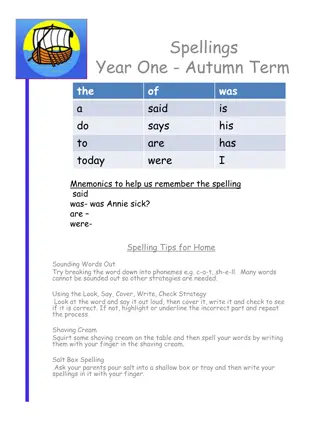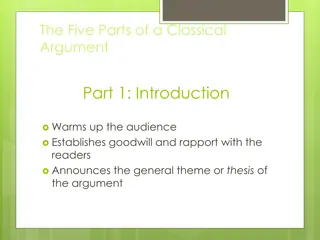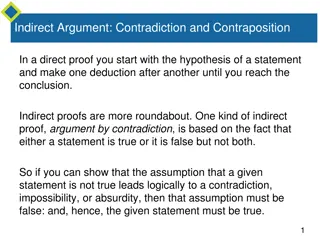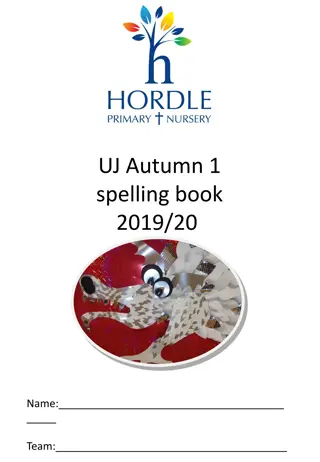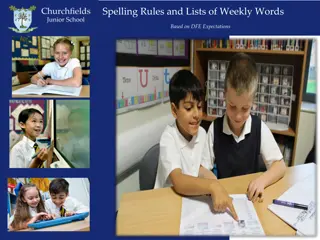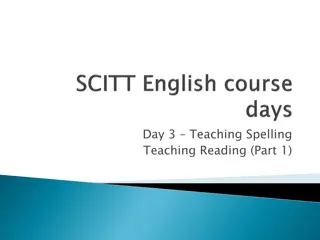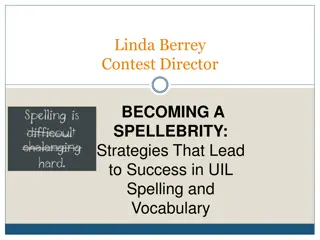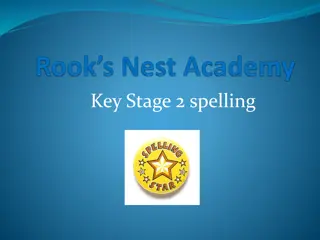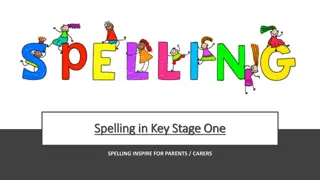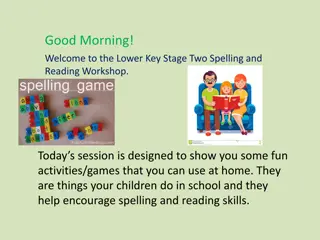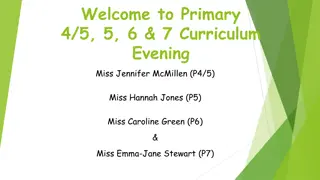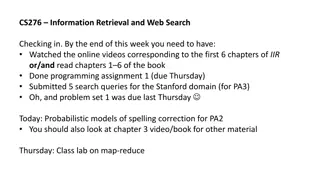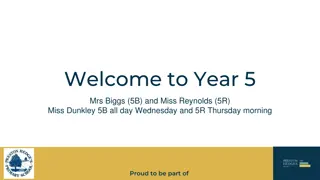Year 5 English Home Learning - Spelling and Balanced Argument Activities
Explore Year 5 English home learning activities for the week, including a spelling lesson using Oxford Owl, practicing challenging words, and planning a balanced argument on whether mobile phones should be allowed in school. Enhance your spelling skills and critical thinking through engaging tasks and word practice. Get ready for a productive week of learning and skill development!
Download Presentation

Please find below an Image/Link to download the presentation.
The content on the website is provided AS IS for your information and personal use only. It may not be sold, licensed, or shared on other websites without obtaining consent from the author. Download presentation by click this link. If you encounter any issues during the download, it is possible that the publisher has removed the file from their server.
E N D
Presentation Transcript
Year 5 English Home Learning W.B: 11.5.20
Year 5 English Balanced Argument
Lesson 1 - For today s spelling lesson, explore Oxford Owl by using our Year 5 login https://www.oxfordowl.co.uk/ Username: coundonyear5 Password: spellings Click on the Extra Practice Zone Choose Year 5 and try the activity Sounds the Same You can check your answers as you go along to see how you are doing. If you find the Year 5 one a bit tricky, try another year group activity
Lesson 1 - Clouds Choose 5 words from the Year 3 and 4 list that you find tricky and 5 from the Oxford Owl spelling activity. Moons Choose 5 words from the Year 3 and 4 or the Year 5 and 6 list that you find tricky to spell and 5 words from the Oxford Owl spelling activity. Stars Choose 5 words from the Year 5 and 6 list and then use your reading book, a dictionary or words that interest you or choose another 5 words from the Oxford Owl spelling activity. You could really challenge yourself and pick 15 words to practice this week!
Lesson 1 - Spelling practise task Use the techniques suggested in Spellings Practise ideas to help you remember these spellings. Use this lesson to practise spelling your selected words. Practice these spellings each day and ask a parent or carer to test you on Friday. Good luck! How many did you get correct? Are there any words you would like to add to your list for next week?
Lesson 2 KS: To plan a balanced argument Should mobile phones be allowed in school? Remember in Week 1 you made a list of all of the reasons FOR and AGAINST having mobile phones in school. From that list, pick the 3 most important reasons FOR mobile phones in school then pick 3 most important reasons AGAINST this same topic.
Lesson 2 KS: To plan a balanced argument Don t worry if you didn t get chance to write a list. Here is a list of reasons you can choose from or just spend a few moments thinking of some of your own.
Use this word bank to help use effective language of debate within your balanced argument. Lesson 2 KS: To plan a balanced argument
Look at the Planning sheet resource for an idea about how to structure your plan. Lesson 2 KS: To plan a balanced argument If you have a printer, make notes on your plan ready to write your balanced argument to Mrs Ellis. If not, then use the planning sheet as a guide to create your own plan in your workbooks. You need: Reasons FOR + evidence/examples. Reasons AGAINST + evidence/examples. What cohesive devices will you use? What language of debate will you use? Use the word bank to help you with using the language of debate and relevant conjunctions.
Lesson 3 KS: To write a balanced argument Today you are going to write your balanced argument to Mrs Ellis debating this issue: Should mobile phones be allowed in school? Remember to use the Success criteria and word bank (the next 2 slides) to make your balanced argument the best it can be!
Remember to include all of these features in your balanced argument. Lesson 3 KS: To write a balanced argument Balanced argument Success Criteria
Here is an example introduction to help you think of how you may structure your own. Lesson 3 KS: To write a balanced argument Mobile Phones - Should they be allowed in schools? Dear Mrs Ellis, As you know, in the last few years there has been an explosion in the use of communication technology, including mobile phones and it is now estimated that a whopping 70% of primary school children now own one! Recently, during lockdown, Year 5 have been considering whether mobile phones should be allowed in Coundon Primary school. Year 5 would like you to make an informed decision based on all the facts, over this issue.
Here is an example FOR paragraph to help you think of how you may structure your own. Lesson 3 KS: To write a balanced argument No one can deny the positive benefits of children communicating freely with each other, and many children argue that using mobile phones is simply one way of doing this. Furthermore, many parents are in favour of mobile phones too as they like the reassurance of knowing their child can be safer and more independent if they have a mobile phone. Since mobile phones allow children to contact their parents at any time, this could reduce potential risks for children who travel to and from school alone. As well as this, supporters of mobile phones suggest that mobiles could support assist learning if they were allowed in classrooms. For example, children would be able to quickly access the internet using their smartphones and conduct research. As a consequence, lesson time could be saved because laptops or Ipads would not need to be accessed for these tasks.
Lesson 4 KS: To write a balanced argument Use this lesson to continue to write your balanced argument to Mrs Ellis. Remember to use the success criteria and the word bank to help you write an effective balanced argument.
Here is an example AGAINST paragraph to help you think of how you may structure your own. Lesson 4 KS: To write a balanced argument However, teachers are concerned that the distraction of mobile phones ringing in classrooms would affect children s education. National league tables also support this notion as they have shown schools which ban mobile see a 6.4% increase in test scores. Schools point out, moreover, that carrying a mobile phone could make a child more vulnerable to theft or mugging, both on the street and even in the playground. Police figures confirm that a high proportion of crimes committed against young people involve thefts of mobile phones. In addition, schools claim that having mobiles to school could create a competitive atmosphere amongst children and result in some children feeling left out, unvalued or even the victim of bullying.
Here is an example CONCLUSION to help you think of how you may structure your own. Lesson 4 KS: To write a balanced argument Although mobile phones clearly offer today s young people lots of opportunity to become more independent, the impact that this technology can have on children s education simply cannot be ignored. It would seem that schools might best support their pupils by making them leave their mobile phones at home.
Class emails 5JT@coundon.coventry.sch.uk 5AS@coundon.coventry.sch.uk 5RB@coundon.coventry.sch.uk Lesson 5 KS: To edit and improve my writing Use this lesson to re-read your balanced argument. Use the success criteria and work bank to check you have included all of the relevant features. It would be great to read some of your balanced arguments. Either type them up or send a photo of your written work and send them to your class email. This way, we can send them to Mrs Ellis and see what she thinks!
Remember to include all of these features in your balanced argument. Lesson 5 KS: To edit and improve my writing Balanced argument Success Criteria
Use this word bank to help use effective language of debate within your balanced argument. Lesson 5 KS: To edit and improve my writing
Spelling test time! Remember Don t forget to ask somebody if they could test you on your spellings! Good Luck! How many did you get correct? Add any tricky words to your spelling list to practise for next week.


